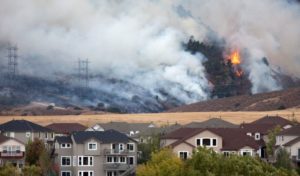
HHS declares a public health emergency in Hawaii, the Bureau of Industry and Security expands nuclear nonproliferation controls on China, and more…
IN THE NEWS
- The U.S. Department of Health and Human Services (HHS) declared a public health emergency in response to the fatal wildfires in Hawaii. HHS’s declaration allows flexibility for health care professionals to meet the needs of Medicare and Medicaid recipients. The declaration of a public health emergency also announced that personnel from the National Disaster Medical System were supporting the state-wide emergency response effort. HHS personnel are cooperating with other federal and state emergency responders to manage the health impacts of the wildfires.
- In response to China’s military modernization efforts, the Bureau of Industry and Security of the U.S. Department of Commerce imposed additional nuclear nonproliferation controls on China and Macau. Licenses are now required for export of items on the nuclear nonproliferation (NP2) list if these materials are bound for a “military end user” in either China or Macau. Affected items include both materials, such as depleted uranium, and equipment, such as generators for nuclear plants. The authors of a comment on the Steptoe International Compliance Blog noted that “these new amendments reflect the trend toward increasing export controls focused on China where there is a U.S. national security, foreign policy, or economic concern with the supply of dual use commercial items.”
- Montana District Court Judge Kathy Seeley enjoined a state law prohibiting consideration of greenhouse gas emissions in the evaluation of fossil fuel permits. Seeley wrote that this limitation violated a state constitutional “right to a clean and healthful environment and is unconstitutional on its face.” Julia Olson, chief legal counsel of Our Children’s Trust, which represented the plaintiffs, predicted that the ruling would “mark a turning point in this generation’s efforts to save the planet from the devastating effects of human-caused climate change.” A spokesperson for Montana Attorney General Austin Knudsen called the ruling “absurd” and said that the office plans to appeal.
- The U.S. Environmental Protection Agency (EPA) denied two petitions from environmental and community groups seeking changes to its enforcement of the Clean Water Act as it relates to concentrated animal feeding operations (CAFO). The petitions sought to strengthen regulation of large livestock farms that release manure and other pollutants into waterways. Although it denied the petitions, EPA announced that it will conduct an evaluation of its CAFO program and establish a panel of representatives of agriculture, environmental groups, researchers and others to develop recommendations and determine whether additional regulations are needed.
- The Internal Revenue Service and the U.S. Department of the Treasury issued final regulations concerning the application of the Low-income Communities Bonus Credit Program, an investment tax credit bonus established by the Inflation Reduction Act of 2022 that is designed to improve access to renewable energy in low-income communities For eligible solar or wind facilities, a project owner can collect an extra 10 percent tax credit, on top of the standard investment tax credit, if its facility is either located in a low-income community or is sited on Indian land. Furthermore, the tax credit can be increased by 20 percentage points if the facility is part of a qualified low-income residential building project or a qualified low-income economic benefit project. These regulations are effective October 16, 2023.
- The U.S. Environmental Protection Agency (EPA) announced it would award grants ranging from $214,000 to $272,000 to Rhode Island, New Hampshire, Maine, Massachusetts, and Connecticut to support water quality monitoring. Radhika Fox, Assistant Administrator for EPA’s Office of Water, remarked that the grants would “help states, Tribes, and territories fund programs to ensure that our coastal waters are safe for swimming and recreation.” This funding is part of $10.6 million in grants, announced in May, to help coastal and Great Lakes communities with water quality monitoring and public notification programs for beaches.
- The U.S. Food and Drug Administration and Centers for Disease Control and Prevention are investigating a Listeria outbreak potentially connected to certain Real Kosher Ice Cream products. As a result of the investigation, Real Kosher Ice Cream has recalled and paused further production of their Soft Serve On The Go cups. Symptoms of Listeria infection, including fever and nausea, can seriously affect at-risk groups, such as people who are pregnant, older, and immunocompromised.
- Coinbase Financial Markets, Inc., a cryptocurrency exchange platform, announced that it has secured approval from the National Futures Association to offer cryptocurrency futures trading to retail investors. Coinbase is apparently now the first cryptocurrency firm to offer such approved futures trading, which “allows consumers to place a leveraged bet on whether the price of a cryptocurrency, or any commodity, will rise or fall.” Faryar Shirzad, Coinbase’s Chief Policy Officer, tweeted that this approval “is a huge milestone for Coinbase as we continue to work toward creating an open financial system that expands the utility and adoption of crypto.”
WHAT WE’RE READING THIS WEEK
- In a recent Brookings Institution report, Qiuping Yu, a professor at Georgetown University’s McDonough School of Business, highlighted the importance of work schedules in future labor policy debates. Yu argued that the widespread practice of unpredictable “just-in-time” scheduling based on “immediate workplace needs” harms worker performance. Although common in the service and retail industries, Yu explained that the practice of last-minute scheduling also exacerbates other social issues, such as difficulties arranging childcare.
- In a recent working paper published by the Max Planck Institute for Tax Law and Public Finance, Professor Wolfgang Schön explored the characteristics of international tax rules that deliver a reliable framework for tax coordination in a shifting global environment. Schön explained that tax coordination helps provide efficiency by avoiding both double taxation and the need to coordinate on cross-border tax enforcement. But he also noted that countries can use national tax regimes to attract investment and business. Schön concluded that workable international tax rules must both be “robust,” meaning not easily disrupted by individual defections, and “resilient,” meaning they allow for modifications by individual countries in the face of changing circumstances. For example, Schön lauded transfer pricing rules as robust, but cautioned that the recently enacted European Union minimum corporate tax Directive may be insufficiently resilient.
- In a recent Brookings Institution report, Mark MacCarthy, a Nonresident Senior Fellow in Governance Studies at the Center for Technology Innovation at Brookings, urged the Biden Administration, Congress, and social media companies to construct a regulatory regime for internet referral programs. An internet referral program refers to the process of a government agency asking a social media company to assess whether certain material on their systems is harmful or illegal. MacCarthy emphasized the need for transparency within internet referral programs and suggested that government agencies should be required to disclose what content the agencies referred to social media companies and why.
EDITOR’S CHOICE
- In an essay in The Regulatory Review, Jim Pauley, President and CEO of the National Fire Protection Association, emphasized the importance of wildfire prevention and preparation. Pauley argued that regulation of building and property maintenance codes in wildfire-prone areas is essential as the cycle of wildfires continues and intensifies with climate change. Pauley also explained that greater training and preparedness are needed at the local and state levels to protect the welfare of residents, particularly in the western United States.



